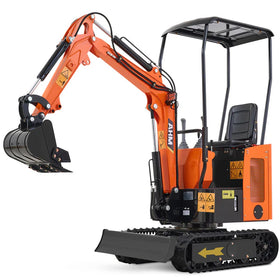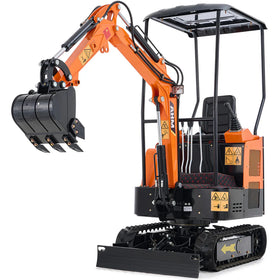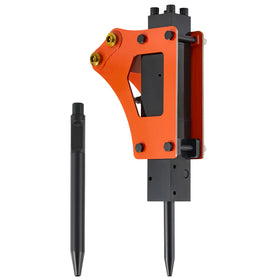For most residential land clearing projects, mini excavators in the 1-3 ton range offer an excellent balance of power and maneuverability. Today's models deliver impressive performance for clearing brush, removing small trees, and preparing land for development. But the "right" size really depends on what you're dealing with. If you're just clearing some brush and small trees in your backyard, a mini excavator might do the trick. For dense vegetation and larger trees, you'll need something beefier.
Quick Guide to Mini Excavator Sizes for Land Clearing
|
Size Class |
Daily/Weekly Rental |
Ideal Applications |
Maximum Vegetation Size |
Best Working Conditions |
|
1-2 ton |
$200-275/day. $600-800/week |
Weekend DIY, small yards, tight spaces |
4" diameter trees, light brush |
Flat, dry ground, residential areas |
|
2-3 ton |
$275-350/day. $800-1,000/week |
Medium projects, mixed vegetation |
6" diameter trees, medium brush |
Moderate slopes, varied soil types |
|
3-4 ton |
$350-500/day. $1,000-1,500/week |
Large projects, dense vegetation |
8" diameter trees, heavy brush |
Steep slopes, challenging terrain |
1. How to Choose the Right Excavator Size for Your Land

According to OSHA's Technical Manual, mini excavators under 3 tons are ideal for residential projects due to their reduced ground pressure and maneuverability in confined spaces.
Before renting or buying an excavator, consider these key factors that will determine the right size for your project:
Property size significantly impacts your excavator choice. A quarter-acre lot with scattered vegetation requires different equipment than a five-acre woodland. For residential lots under half an acre, mini excavators (1-3 tons) typically provide sufficient power while maintaining maneuverability around existing structures.
Vegetation density and size are crucial factors:
- Light vegetation (brush and saplings): 1-2 ton mini excavators work well
- Medium vegetation (trees up to 6 inches): 2-3 ton mini excavators
- Heavy vegetation (trees over 6 inches): Standard excavators (4+ tons)
2. Mini Excavator Performance for Land Clearing
Mini excavators excel at residential projects but have specific limitations you should understand. A typical 1-3 ton mini excavator can clear approximately 1/4 acre of light vegetation per day. However, performance varies based on conditions:
Terrain type affects excavator effectiveness:
- Flat, dry ground: Optimal performance with any size
- Soft or wet ground: Lighter machines (1-2 tons) prevent surface damage
- Sloped areas: 2-3 ton machines provide better stability while maintaining maneuverability
Among compact excavators, the AHM 1 ton mini excavator with its 13.8 hp Kubota D722 engine excels in residential land clearing projects. Its 5.7 ft digging depth and 2698 lbf digging force provide impressive capability for a machine this size, while rubber tracks ensure it won't damage lawns or pavement. Perfect for backyard projects, it features ISO-standard hydraulic controls and accommodates various attachments for versatile clearing work.
3. When to Use a Larger Excavator
While mini excavators are versatile, certain situations require larger machines:
- Projects involving trees over 6 inches in diameter
- Properties larger than half an acre
- Dense woodland areas with thick root systems
- Rocky terrain requiring more powerful digging capability
Step up to a medium excavator (2-3 tons), and you're looking at $275-350 daily. The extra muscle pays off though - these machines can handle a quarter acre of mixed vegetation per day. They use slightly more fuel at 1.5-2 gallons per hour, but the increased productivity often makes up for it.
Large excavators (4+ ton) start at $350-500 daily and consume 2.5-3.5 gallons of fuel per hour. But they can power through half an acre of heavy vegetation daily, making them the right choice for serious land clearing projects.
4. Matching Excavators to Terrain

Your ground conditions matter just as much as what's growing on it. On flat, dry ground, any size excavator will perform as expected. But soft or wet ground calls for lighter machines to prevent surface damage. For slopes, a 2-3 ton machine gives you the sweet spot of stability and maneuverability.
5. Essential Excavator Attachments for Land Clearing
The right mini excavator attachments turn your excavator into a more versatile clearing machine.
- Thumb attachments make grabbing and moving brush and logs much easier.
- Brush cutters handle thick vegetation, while root rakes speed up cleanup.
- If you're dealing with a lot of vegetation, consider a mulching head - it'll process the material as you go, saving you disposal costs.
Conclusion

Think about your whole project timeline when choosing an excavator size. A machine that's too small might save you $100 per day in rental costs but add several days to your project. Factor in operator costs, fuel, and your time value when making your decision.
Get quotes from multiple rental companies and ask about weekly rates if your project might run longer than a few days. The right size machine, rented for the right amount of time, can save you thousands on your land clearing project.







